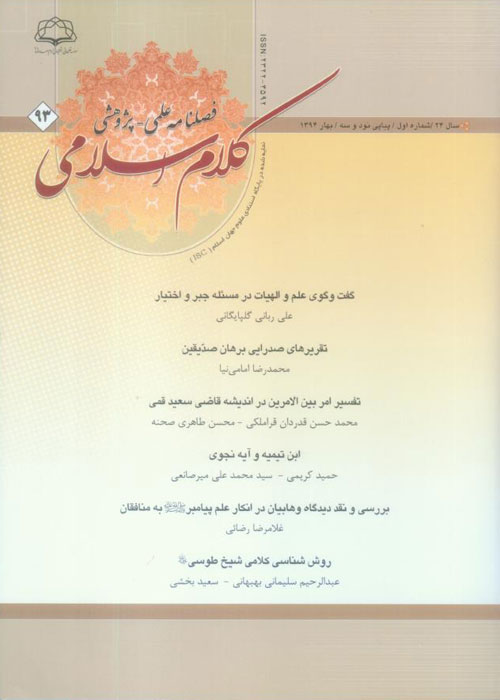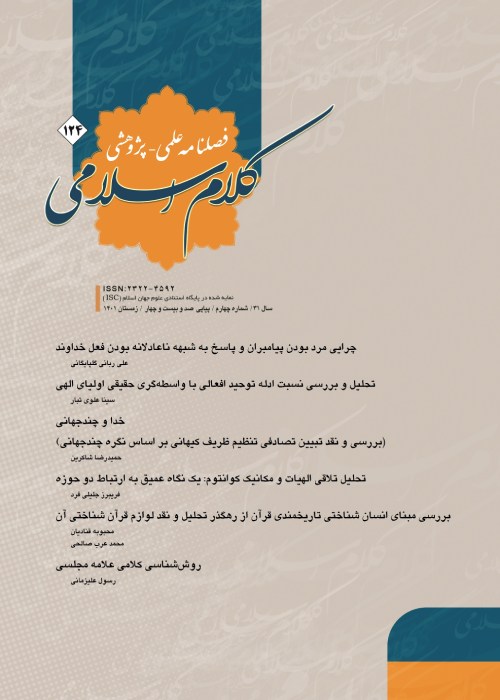فهرست مطالب

نشریه کلام اسلامی
پیاپی 93 (بهار 1394)
- تاریخ انتشار: 1394/03/18
- تعداد عناوین: 7
-
-
صفحه 29
-
صفحه 83
-
صفحه 119
-
صفحه 143
-
Page 9The question of predestination and free will is one of issues of dialogue between science and theology. In theology there are two views of determinism and violation and on the other hand, in classical physics, determinacy principle or casual determinism has been officially accepted while in quantum physics, this principle has been doubted or has been denied about atomic phenomena and has been replaced with uncertainty principle and deferent interpretations of it has been presented. There are people who regarded determinacy principle in classical physics as a scientific evidence for the theory of predestination in theology while others have regarded uncertainty principle in quantum physics as a scientific evidence for the theory of violation. These two suppositions have been criticized by a third group of theologians and scholars. The mentioned views have been explained and analyzed in the present writing.Keywords: predestination, volition, mechanical necessity, uncertainty principle, similarity principle
-
Page 29The proof of the faithful is the proof that the transcendental theosophy posed to prove the existence of the necessary being by contemplating the reality of existence. Mulla Sadra presented different accounts of this proof. In his most known expression and based on the quadruplet principles of essentiality, simplicity and gradational unity and its division into necessary that is independent, needless and perfect; and contingent that is dependent, needy and imperfect, expressed the proof. The expressions of the commentators of transcendental theosophy have been categorized in four groups according to their principles: the first group, based on the essentiality of existence and its division into independent and dependent, the second group, based on essentiality of existence and its considering in two ways of reality of existence and negatively conditioned being, the third group, based on the principle of essentiality of existence, and the forth group based on essentiality of reality have been shaped. According to transcendental theosophy, the advantage of the proof of the truthful in comparison to other proofs of the existence of God stems from merits like: sameness of the way and the goal, needlessness to proving the invalidity of circular reasoning and infinite regression, and proving the particular attributes of the almighty necessary being. Divine theosophists have been inspired with the proof of the faithful by verses of the noble Quran and the narrations of the infallibles.Keywords: proof of the faithful, reality of existence, existence necessary by itself, essentiality of existence, independent existence, gradational unity, dependent existence, indigent contingency
-
Page 63The theory of intermediate position is a guidance presented by the infallibles in opposition to determinism and libertarianism and Shiite theologians and philosophers offered different exegeses of it. From among these exegeses is that of the sage Ghazi Sad Ghommi. He tries to find an answer to the question of relationship between Divine Activity and attributing an action to man and the way we can put these two kinds of activity or attribution together. In his exegesis, Ghazi Said invalidates any kind of attribution of mans actions to God either directly as asharites believes or indirectly as peripatetic philosophers believe. He also invalidates former necessity of action and regards it as a kind of determinism. On the other hand he attributes mans action to the man himself and explains that there is only one will and determination in the status of mans action and it is mans will and determination. Nevertheless, he regards mans determination as the manifestation of Gods determination and with such a view, regards man as dependent in determination and doing actions.Keywords: free will, determinism, libertarianism, the intermediate position
-
Page 83One of Imam Alis exclusive nobilities is that he acted according to the verse of najva (whisper). God ordered the faithful in this verse to pay alms before their private talk with the prophet. The only one who did it was Imam Ali and this verdict was also abrogated after a while. While Ibn Taymiyyah accepted that Imam Ali was the only companion who acted according to this verse he tries to deny it as a sign of nobility but the contemplation on the verse of whisper and the narrations which were issued in the case of the verse reveal the invalidity of his view.Keywords: the verse of whisper, Imam Ali, Ibn Taymiyyah
-
Page 101Ibn taymiyyah and Wahhabies have denied the Prophets knowledge of the hypocrites. They claim that the Prophet did not know the hypocrites of Medinah and its outskirts while this claim is contrary to many verses and narrations and historical testimonies which signify the exact and elaborate knowledge of the Prophet about the hypocrites. It can be inferred from verse 33 of chapter Muhammad, verse 44 of chapter Tawbah, verses 44 and 143 of chapter Nesa and many other verses that the Prophet had known the hypocrites completely. Narrations quoted from the Prophet about some historical events in his era like the narrations about the aggressive lot, the event of aqaba (difficult pass), Zirar Mosque, love or hatred about Imam Ali as the criterion of faith and hypocrisy reveal the fact according to which not only the prophet but many of his companions knew the hypocrites with their names and characteristics. In addition, the verses which signify that prophets and friends of God especially the Prophet are shaheed and shaahed (testimony) necessitate the prophets exact knowledge about the features, acts and personalities of the hypocrites.Keywords: the holy Prophet, Shaheed, Shaahed, hypocrites, Ibn taymiyyah, Wahhabies
-
Page 119Sheikh Tusi is one of the first grade Shiite philosophers in the fifth century (A.H.). He was an expert in all Islamic sciences and skills and wrote books in these areas, so this characteristic caused a kind of comprehensiveness in his theological discussions. His use of logic, hadith, exegesis of Quran, Quranic sciences, history, cosmology, literary studies, testify to this reality. His method mostly is rational and analytical with a logical order. He uses all kinds of arguments like analogy, induction, demonstration, dialectic and in some cases used transmitted arguments like Quranic verses, narrations and consensus. He had an essential role in establishment, spread and completion of Shiite theology.Keywords: Seikh Tusi, theological method, methodology, rational sciences, transmitted sciences, theoretical reason, practical reason


